The release of ChatGPT by OpenAI (chatbot built on top of OpenAI’s GPT-3.5 that interacts in a conversational way) at the end of last month became a tipping point for AI that took the world, including the SEO industry, by storm due to the comprehensiveness and quality of answers, even making Google’s management to issue a ‘code red’ due to its rising popularity to look for information.
However, it’s important to be aware of its limitations, many of which were explained at the time of its release, and in this and this comprehensive guides covering ChatGPT by Roger Montti, like not being aware of content created after 2021, built-in biases, and ultimately, the fact that featuring purely AI generated content violates Google’s guidelines.
Specifically, Barry Schwartz covered how when asked about “Using AI to plagiarize the content, modify it, and then outrank in search results?” Google has mentioned that:
Scraping content, even with some modification, is against our spam policy.” Duy added that Google has “many algorithms to go after such behaviors and demote site scraping content from other sites.
However, there are many other use cases for ChatGPT to support our day to day SEO activities -important to highlight the “support” role here, rather than letting it run them completely in autopilot-.
In fact, as explained by Vincent Terrasi here, mastering prompts -instructions to guide a conversation or interaction with AI- will become an important skill for SEOs to generate the desired results, for which there are already resources like “Awesome ChatGPT Prompts”, “ShareGPT” or “LearnGPT” repositories.
There have also been extensions and guides developed to facilitate the usage of ChatGPT, as well as related tools that have been recently launched that are worthy to check out:
- ChatGPT for Search Engines
- ChatGPT for Google
- The Art of ChatGPT Prompting: A Guide to Crafting Clear and Effective Prompts
- Perplexity Ask Anything
- Jasper Chat
- YouChat
Taking all of this into consideration, as many of you, I’ve been playing with ChatGPT in the latest weeks to identify ways to leverage in SEO tasks. Here are 20 of them that you can use as a reference too:
Keyword Research
1. Generate relevant topics to target
“Generate a list of X popular questions related to “<keyword>, that are relevant for new <audience>”
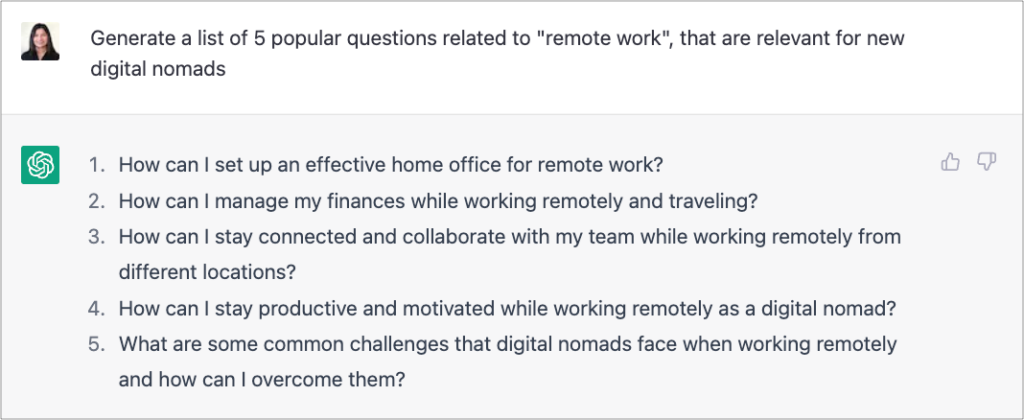
2. Classify a list of keywords based on their search intent
“Classify the following keyword list in groups based on their search intent, whether commercial, transactional or informational: …”
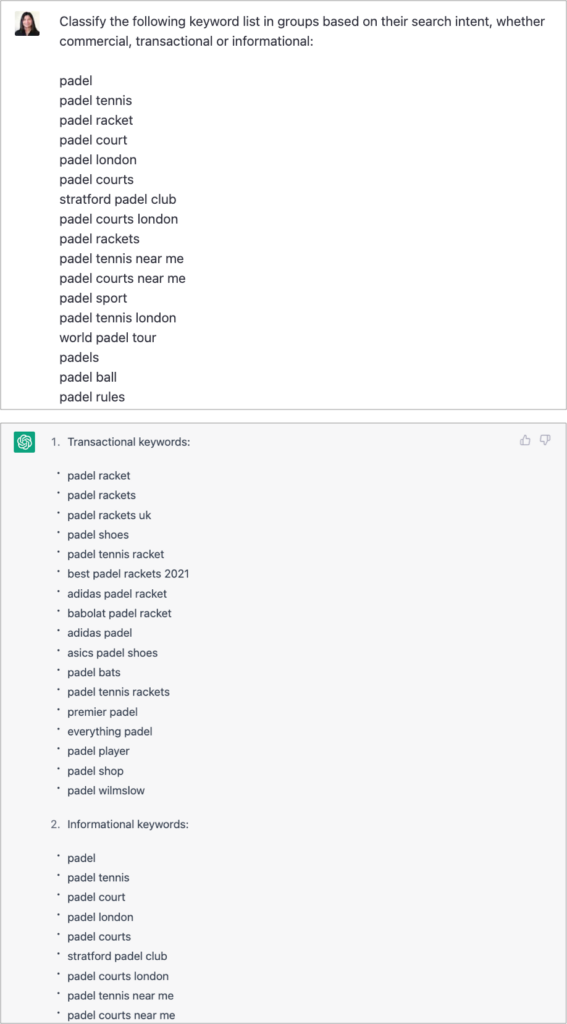
3. Cluster a list of keywords based on their semantic relevance
“Cluster the following keywords into groups based on their semantic relevance: ….”
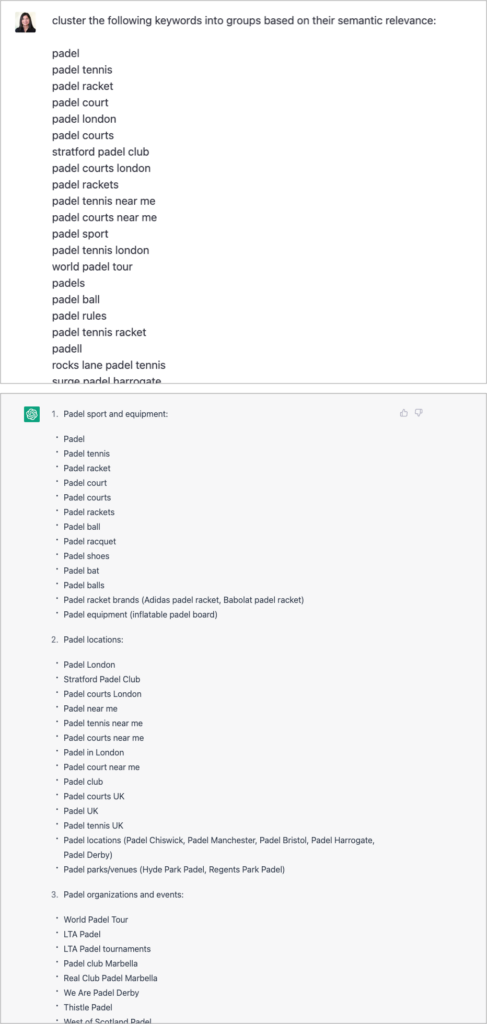
4. Translate a list of keywords
“Translate the following keywords from <Source Language> to <Output Language> and generate the results in a table with two columns, with the keywords in <Source Language> in the first one, and their translation to <Output Language> in the second:”
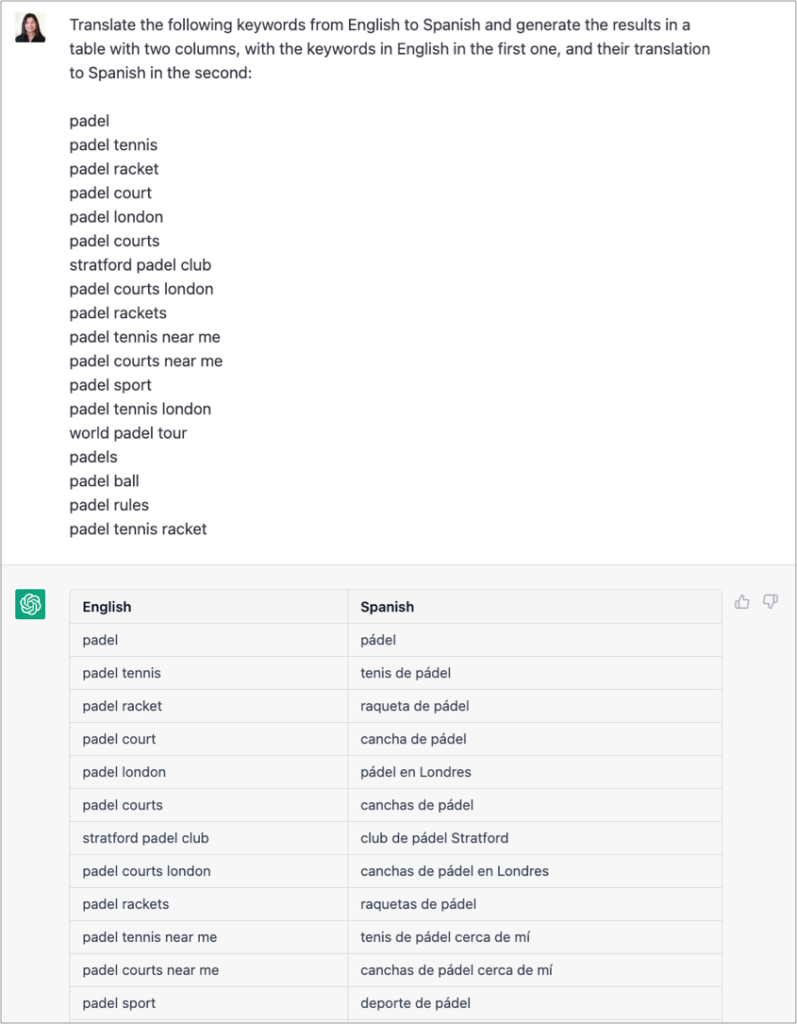
Content Optimization
5. Generate titles for your page content
Copy/paste your page content and ask:
“Generate X unique title tags, of a maximum of 60 characters, for the following text. They should be descriptive and include the term <keyword> in them: …. “

6. Generate meta descriptions for your page content
The same can be done for meta descriptions, also specifying that they should be catchy and include a call to action:
“Generate Z unique meta descriptions, of a maximum of 150 characters, for the following text. They should be catchy with a call to action, including the term “Main keyword” in them: ….”
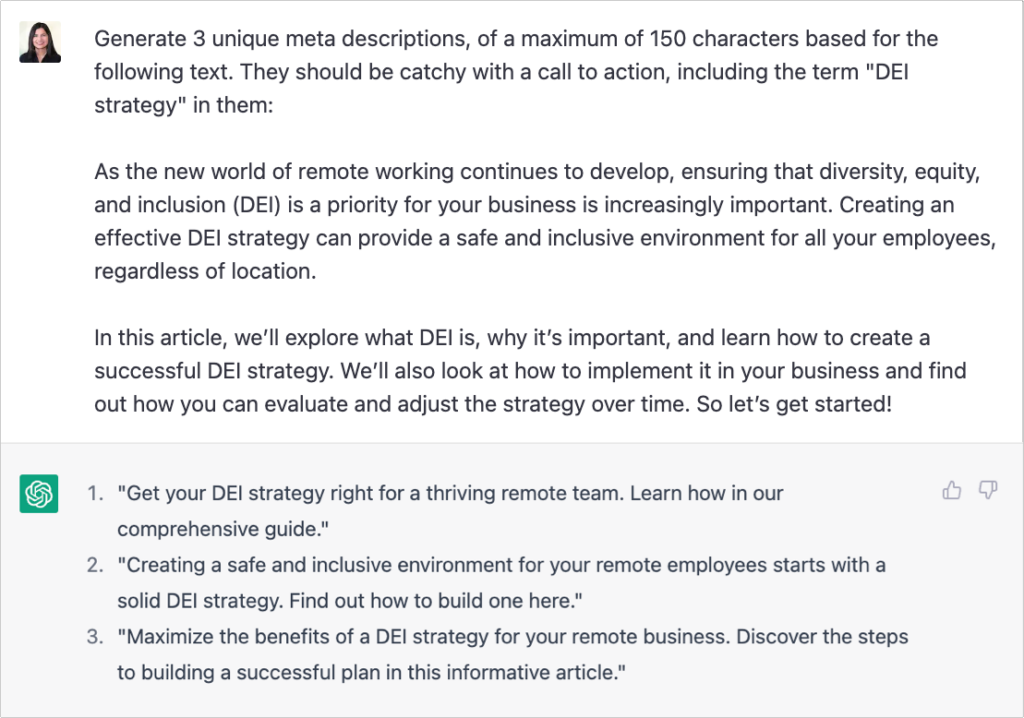
7. Rephrase your existing content to avoid duplication
Generate different versions of a text to avoid content duplication:
“Rephrase the following paragraph in X different ways, to avoid repetition, while keeping its meaning: … “
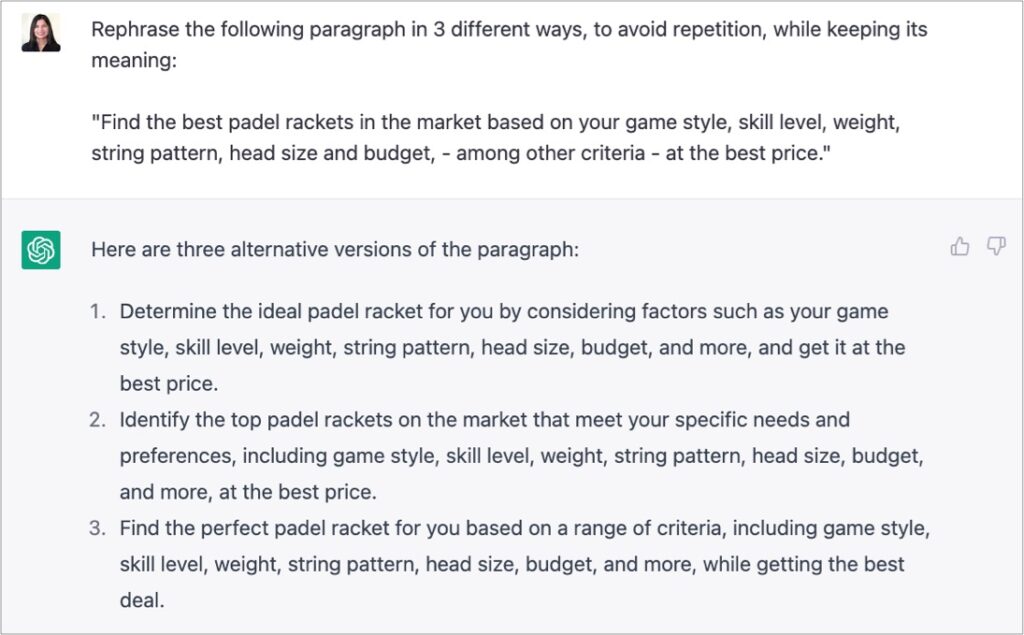
8. Generate FAQs based on your content
“Generate a list of X frequently asked questions based on the following content: …”

9. Provide facts and stats to use as an input to back your content
“Generate a list of the top 10 facts, statistics and trends related to <topic>, including their source”
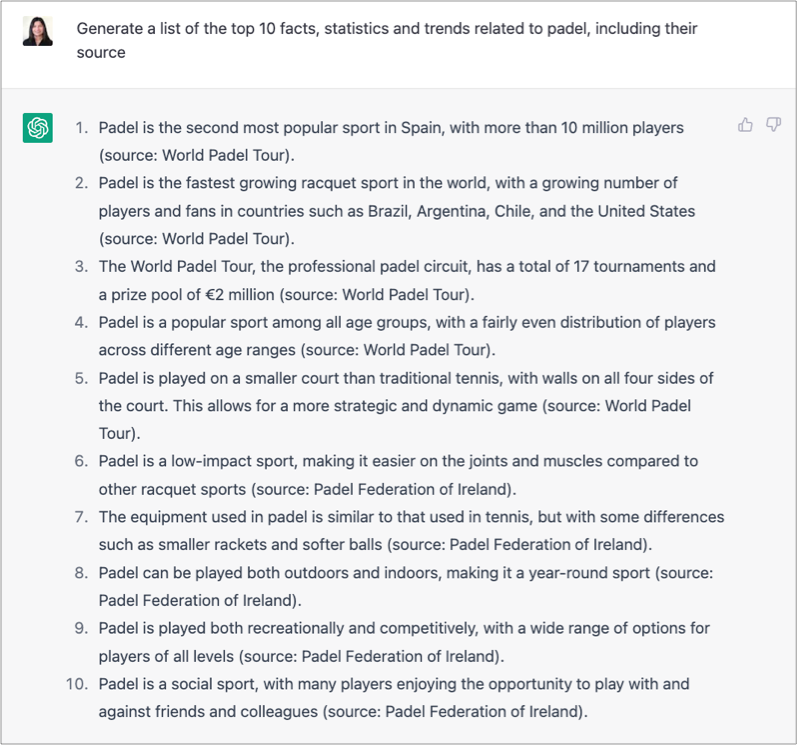
10. Generate a summary of your content
“Generate an X words summary of the following content: …”
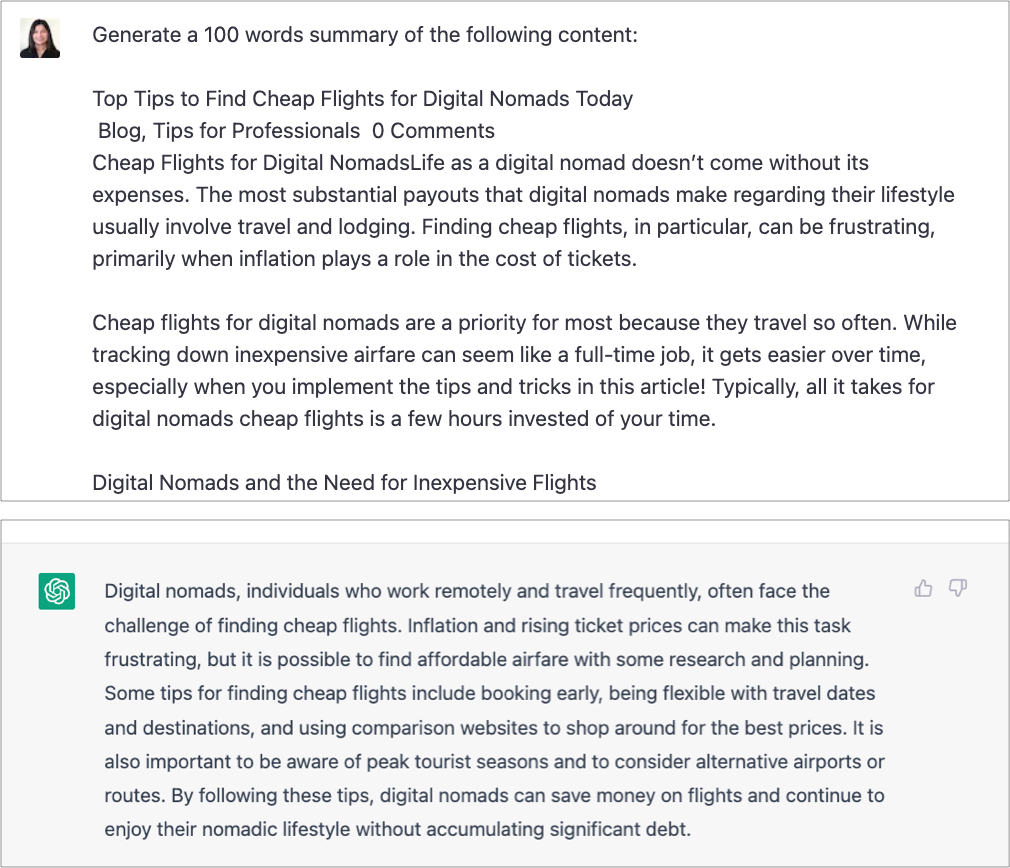
11. Perform sentiment analysis of content
“Specify the sentiment of the following titles, assigning them the values of: positive, neutral or negative. Generate the results in column, including the titles in the first one, and their sentiment in the second: …”
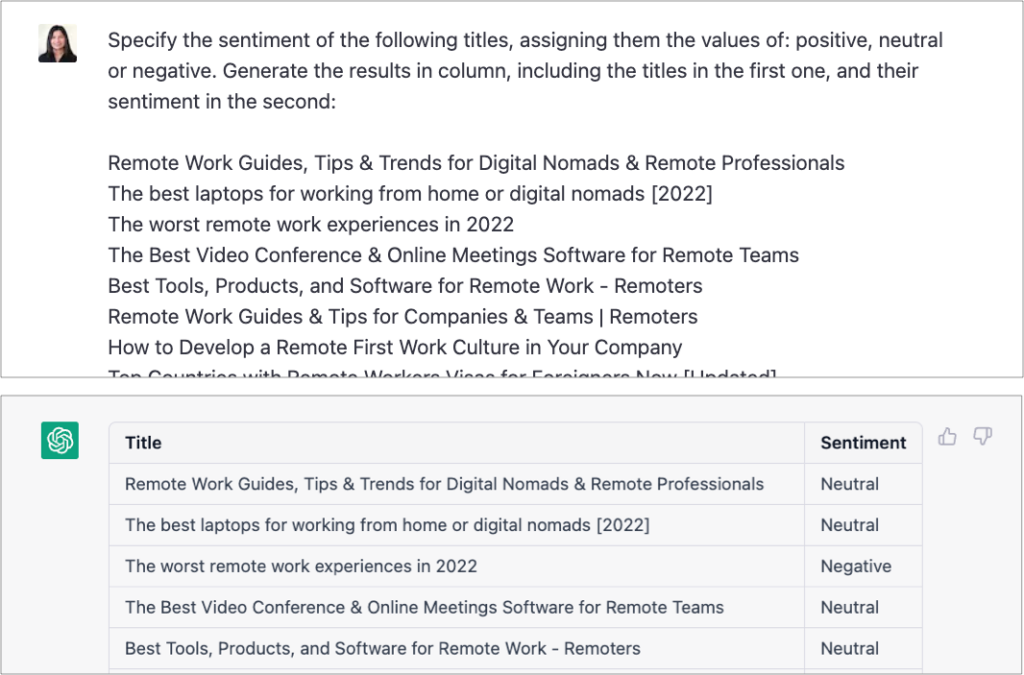
12. Cluster articles using their titles semantic relevance
“Cluster the following titles into groups based on their semantic relevance: …”
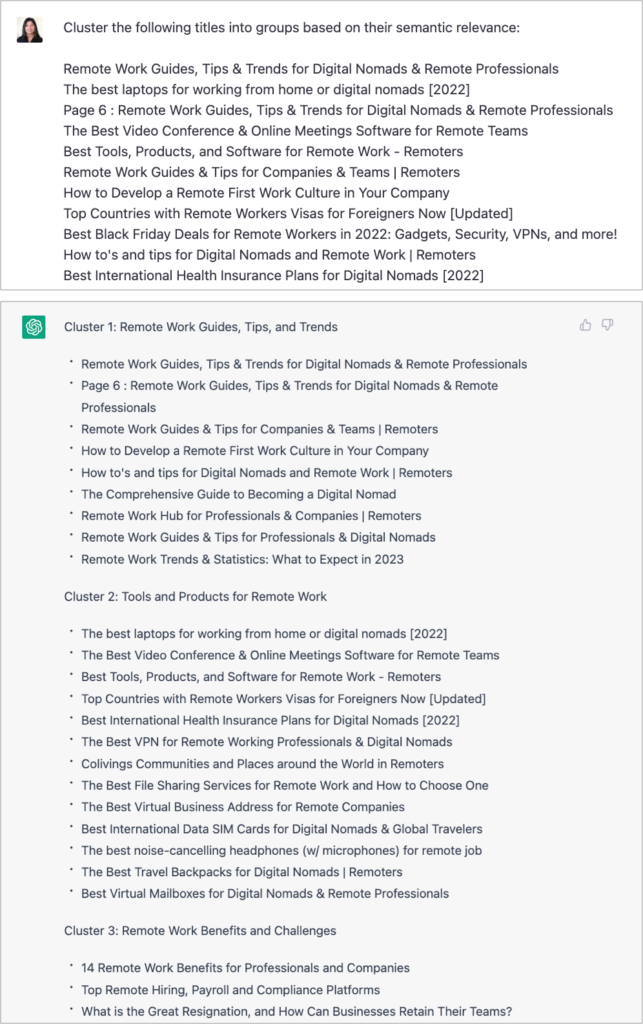
Technical Optimization
13. Generate Structured Data for your content
“Generate the FAQPage Schema markup for the following questions and answers:…”
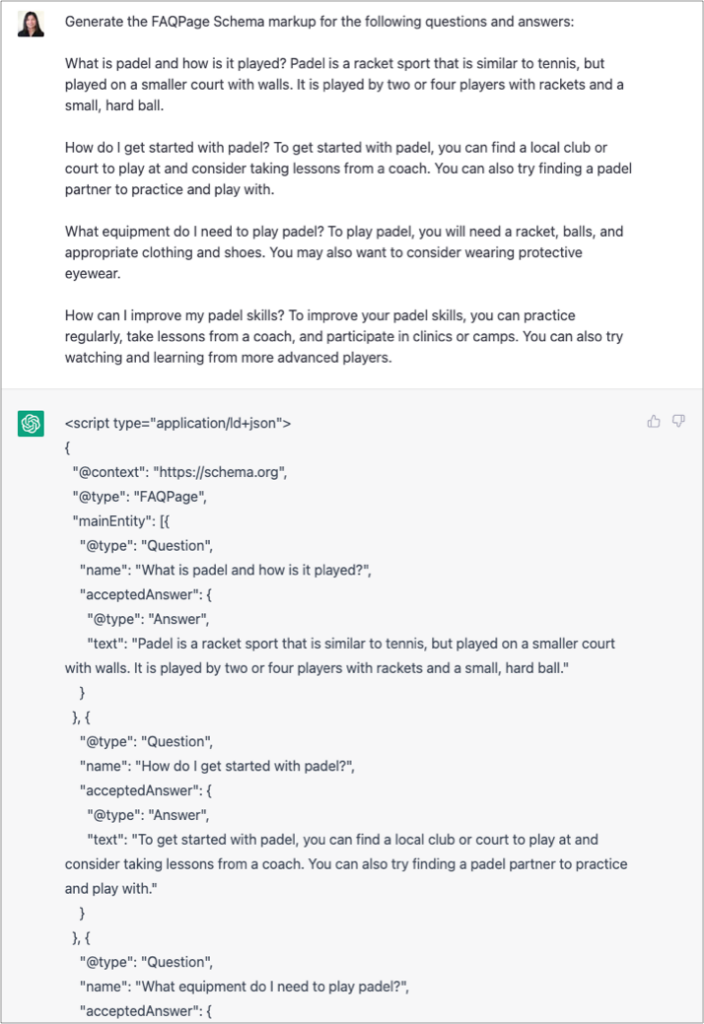
14. Generate Hreflang tags for to use as patterns for your site pages
“Generate the hreflang tags to feature in pages targeted to the <country> in <language>, <country> in <language> and <country> in <language>…”
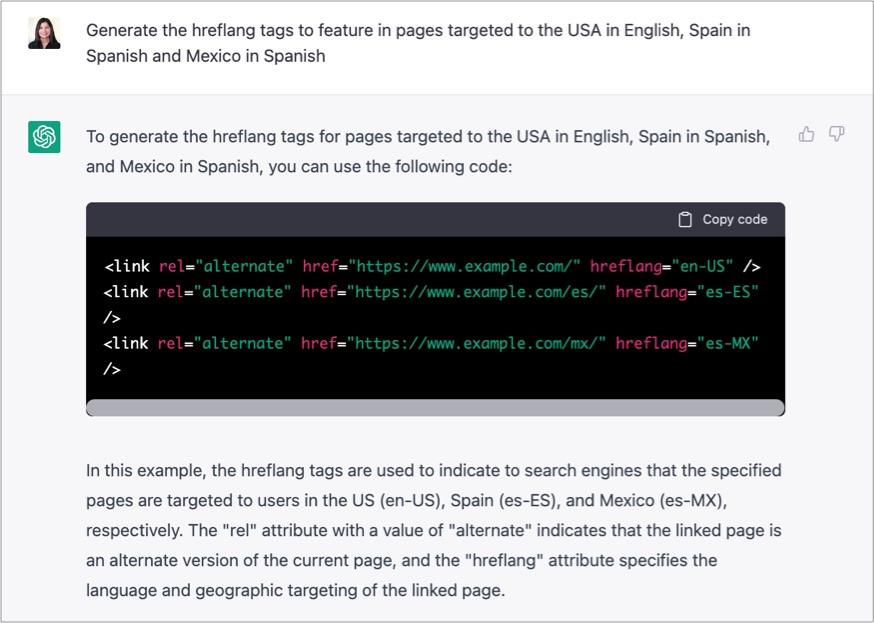
15. Generate .htaccess rewrite rules for redirects
“Generate the .htaccess rewrite rules to 301-redirect <source location> to <location destination> …”
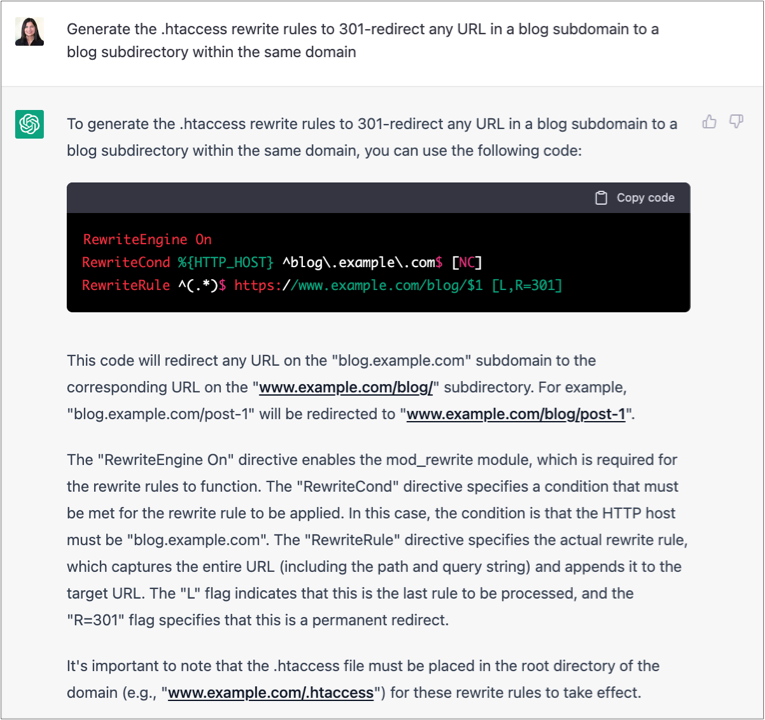
16. Generate the rules for your robots.txt
“Generate a robots.txt rules to block the crawl <location to block> but allow the crawling of <location to crawl> within the domain …”
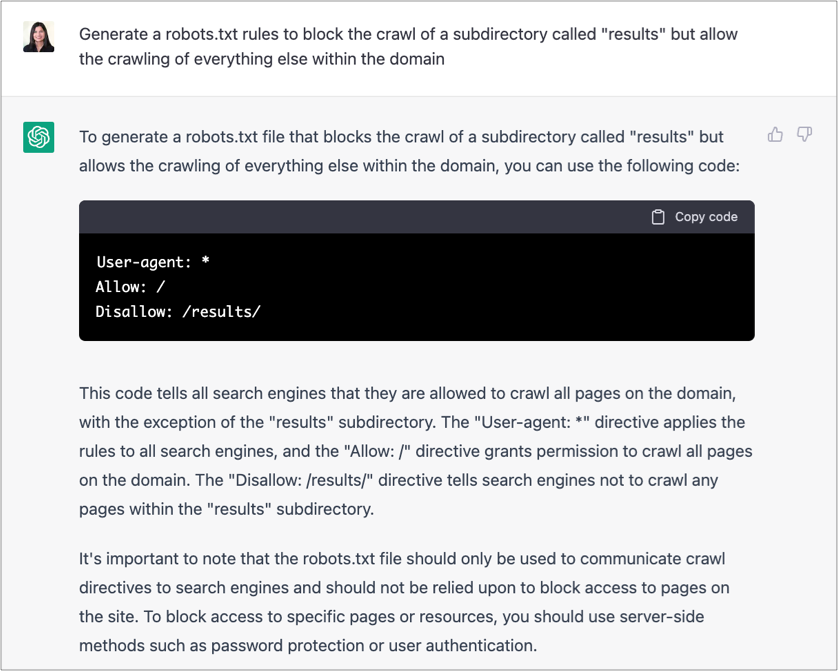
Link Building
17. Generate popular and relevant sites to outreach
“Recommend X popular blogs about <site area> that cover “<topic>” along with their URLs”

18. Reword outreach emails to make them unique
Let’s use one of the templates shared by Ahrefs in this guide and ask to reword it to make it unique:
“Rephrase the following email while keeping its meaning, to make it sound fun but still professional: …”
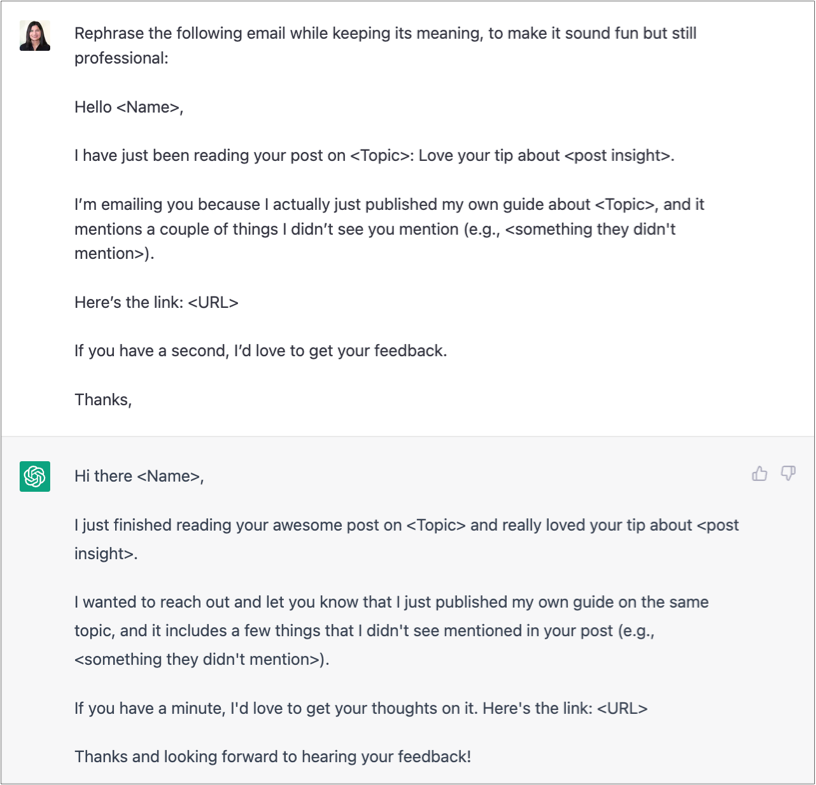
19. Help you answer Help a B2B Writer or HARO requests
“Please write a professionally sounding and short reply to the following “Help a B2B Writer” request saying that I have first hand experience and happy to provide the input needed as long as I don’t mention the site names: …”
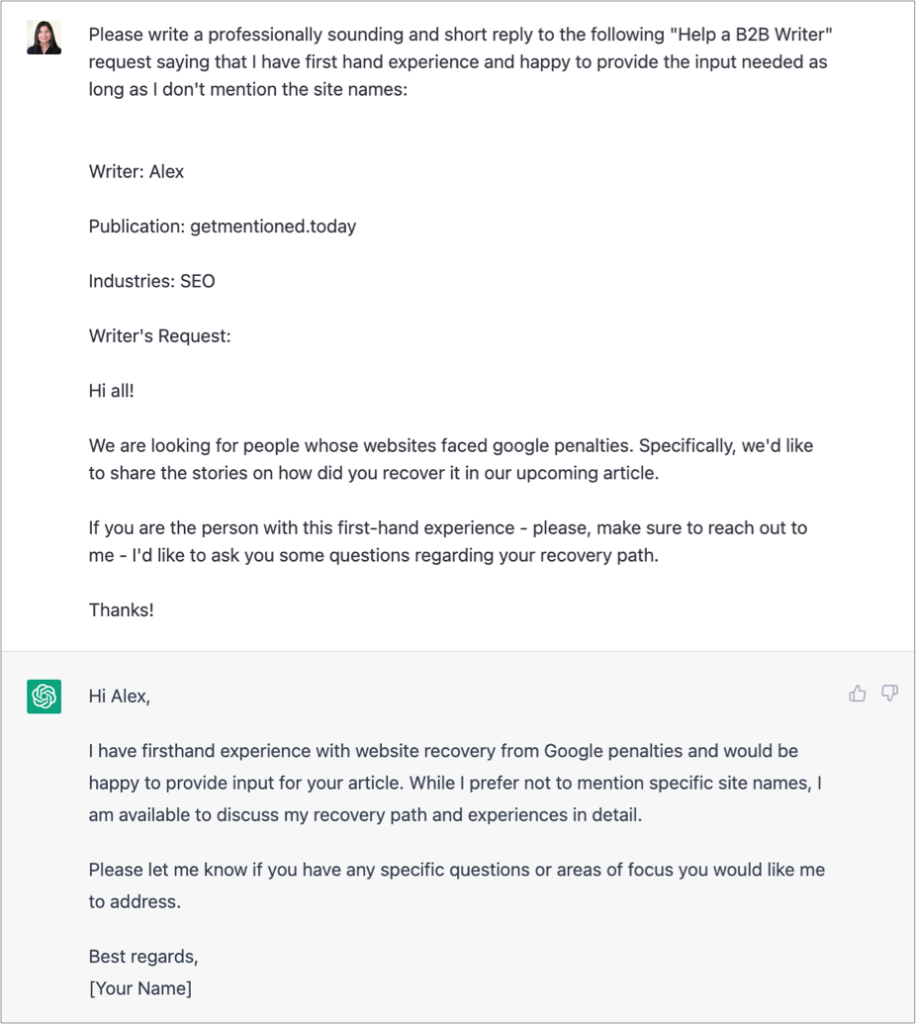
Check out the “GPT-3 + HARO Journo Response Generator” that automates even further steps of the process.
SEO Reporting
20. Generate RegEx to filter Google Search Console Performance Report
“Generate a regular expression that matches any of the following terms:<term 1> <term 2> <term 3>”
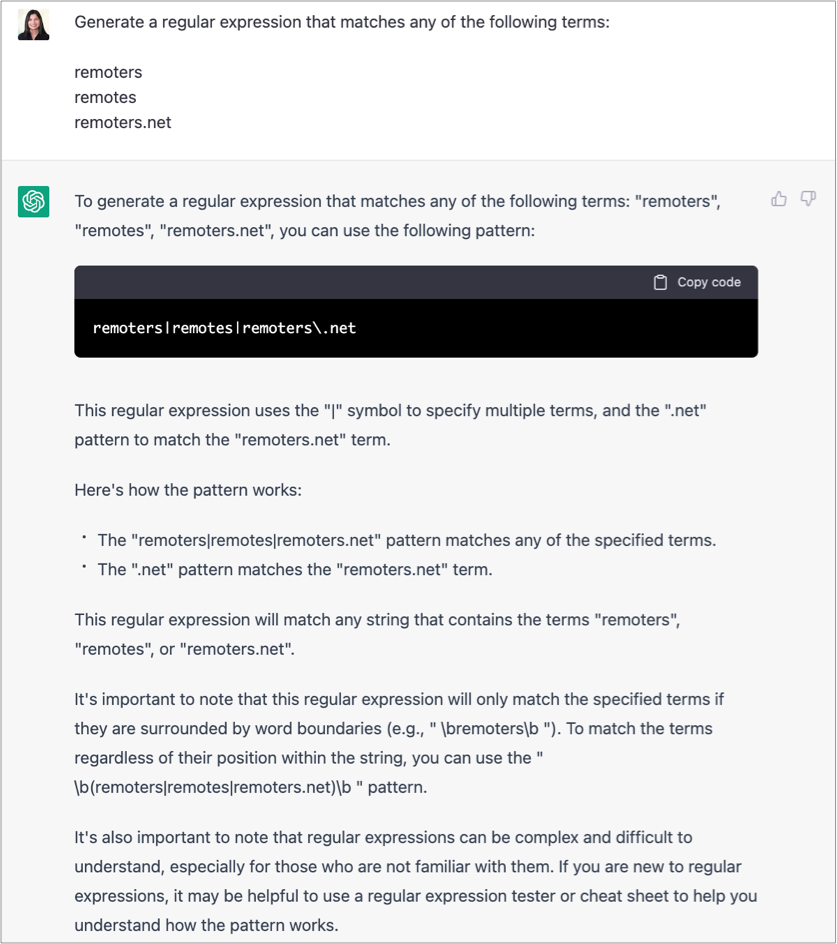
4 Comentarios
Just one word: stunning.
Thank you so much for your content, always so brilliant! I also use it to extract the 10 most relevant entities about a piece of content.
Thanks Aleyda for this post. The list is good and what I really like is that you’re showing the inputs. ChatGPT is great because it works in other languages as well.
This is awesome Aleyda. ChatGPT will also generate a regular expression for a simple question like: Generate a regular expression that matches questions. Very useful to find low competition keywords and FAQs.